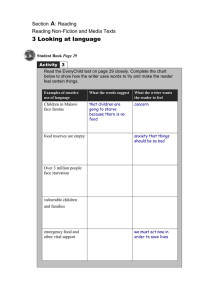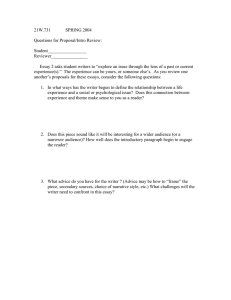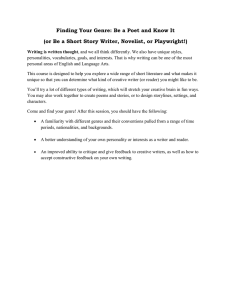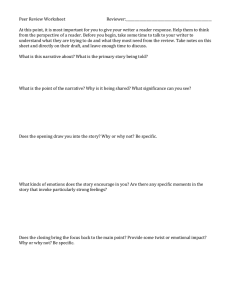UNIVERSITY OF MASSACHUSETTS DARTMOUTH WRITNG & READING CENTER
advertisement
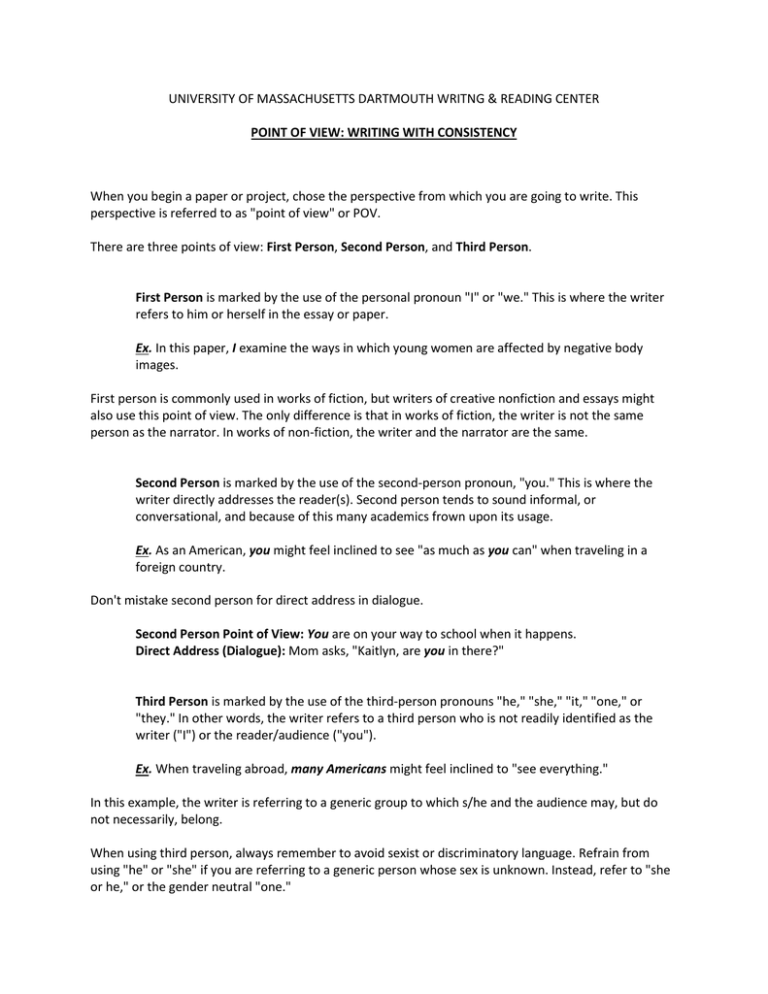
UNIVERSITY OF MASSACHUSETTS DARTMOUTH WRITNG & READING CENTER POINT OF VIEW: WRITING WITH CONSISTENCY When you begin a paper or project, chose the perspective from which you are going to write. This perspective is referred to as "point of view" or POV. There are three points of view: First Person, Second Person, and Third Person. First Person is marked by the use of the personal pronoun "I" or "we." This is where the writer refers to him or herself in the essay or paper. Ex. In this paper, I examine the ways in which young women are affected by negative body images. First person is commonly used in works of fiction, but writers of creative nonfiction and essays might also use this point of view. The only difference is that in works of fiction, the writer is not the same person as the narrator. In works of non-fiction, the writer and the narrator are the same. Second Person is marked by the use of the second-person pronoun, "you." This is where the writer directly addresses the reader(s). Second person tends to sound informal, or conversational, and because of this many academics frown upon its usage. Ex. As an American, you might feel inclined to see "as much as you can" when traveling in a foreign country. Don't mistake second person for direct address in dialogue. Second Person Point of View: You are on your way to school when it happens. Direct Address (Dialogue): Mom asks, "Kaitlyn, are you in there?" Third Person is marked by the use of the third-person pronouns "he," "she," "it," "one," or "they." In other words, the writer refers to a third person who is not readily identified as the writer ("I") or the reader/audience ("you"). Ex. When traveling abroad, many Americans might feel inclined to "see everything." In this example, the writer is referring to a generic group to which s/he and the audience may, but do not necessarily, belong. When using third person, always remember to avoid sexist or discriminatory language. Refrain from using "he" or "she" if you are referring to a generic person whose sex is unknown. Instead, refer to "she or he," or the gender neutral "one." Ex. An American traveling abroad might make him or herself inclined to see "as much as possible." Ex. In times of distress, one might find meditation to be of great comfort. When in doubt, you can change singular nouns to plural and use the gender neutral "they." Ex. Americans traveling abroad might find themselves inclined to see "as much as possible." Consistency Be consistent with your point of view choice. Don't switch point of view in the middle of your essay. If you do make such a switch, it's usually done for a certain effect: For example, you might wish to begin a personal narrative in second person, to "pull" the reader into the text before switching to your primary point of view, first person: Ex. Have you ever noticed that your most embarrassing moments are inevitably the most public? One minute, you're flying at fifty miles per hour on a Waverunner across a relatively calm July bay and the next you're flipped over the handlebars and are standing neck deep in water, a hoard of wide-eyed beach-goers gawking at you and your Uncle Tim asking, "Mel? Mel? You okay? Talk to me, buddy." At least, in my experience, this marriage between the public and the embarrassingly private occurs all too often. In this case, the writer has chosen to open the narrative in second person in order to make the reader feel like he or she is part of the action. The dominant point of view, which we see in the first line of the second paragraph, is first person. There is a clear distinction between you (the reader) and I (the writer). Another way a successful point of view shift might be effected is if the writer alternates between first/second person and a more inclusive "we." In this case, the writer makes him or herself part of the audience, but also remains separate from it. First/Second Person/"We": One thing I have noticed - and maybe you've noticed this, too - is that we humans have the capacity to bring out the best in each other, and alternatively, to bring out the worst. The author's purpose is clear: to identify as belonging to the same group as the reader - "we humans" but also to remain distinct. The writer doesn't assume that the reader has also made the same conclusion. Problems occur when it is no longer clear to whom the writer is referring and when. Usually, these shifts occur between or within sentences, and indicate a switch in the subject of the address. SWITCH: College freshmen might sometimes get involved in a number of extracurricular activities only to realize mid-semester that you're over-extended. In the above example, "college freshmen" are distinctly different from the reader or "you." However, by switching to second person halfway through the sentence, "college freshmen" and the reader(s) become the same ("you"). The problem here is that the writer hasn't made it clear who is referred to: is the reader a college freshman? Or does the writer wish to talk more generally to readers who may not be college freshman? (Perhaps s/he is writing to college professors, counselors, or administrators, all of whom might be concerned about the problems experienced by college freshmen.) The answer isn't readily obvious. To clarify, stick with one for of address: third person or second. Consistent: College freshmen might sometimes get involved in a number of extracurricular activities only to realize mid-semester that they're over-extended. Consistent: As a college freshman, you might sometimes get involved in a number of extracurricular activities only to realize mid-semester that you're over-extended. Shifts between first and second person, or between first and third person, are also jarring. Switch: When I settle into write a research paper, it's important that you first know what you're writing about. In this case, is the writer referring to his/her own experience? Or is s/he providing direction for the reader/audience? If using a point of view shift, make certain it's clear to whom you are referring and when. Switch (consistent): Generally speaking, when writing a research paper I find it's helpful that you know what you're writing about. Generally speaking, when writing a research paper I find it's helpful that one knows what one is writing about. The generally speaking clues the reader in: the writer isn't speaking about his/her experience specifically, but about a collective experience. Exercise: Read through the following passage, identifying shifts in point of view that render the passage unclear. Revise and rewrite the passage for clarity. When Americans travel to foreign countries, you might be tempted to "see everything." When I went to Paris last summer, we had tend days' worth of sightseeing packed into five. Travelers might find that they see more this way, but let me tell you that we didn't. While we literally saw everything on a traveler's agenda we didn't really see much of anything. You might be allowed only one hour in the Louvre, just enough time to snap a picture of the "Mona Lisa" and maybe "The Virgin on the Rocks." We had only a half hour to peruse the famous department stores and forty-five minutes in the Latin Quarter, barely enough time for one to savor a good glass of merlot. Written by Robin Kish 2011 Staff UMD Writing Center
